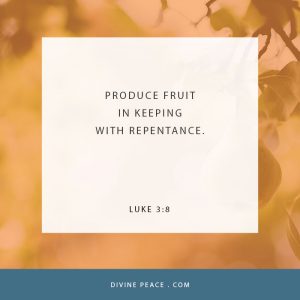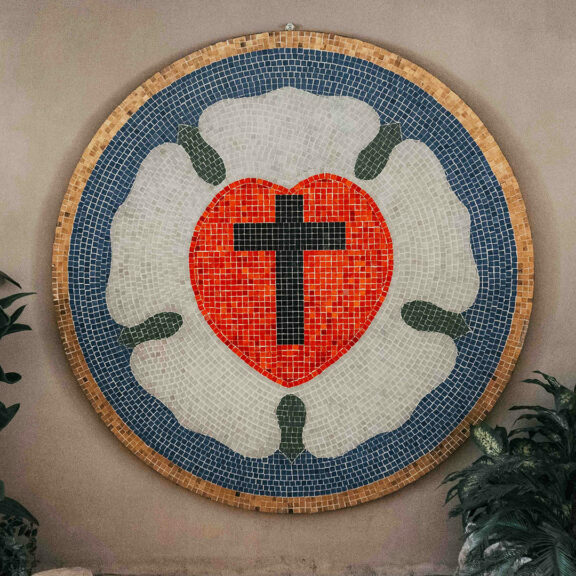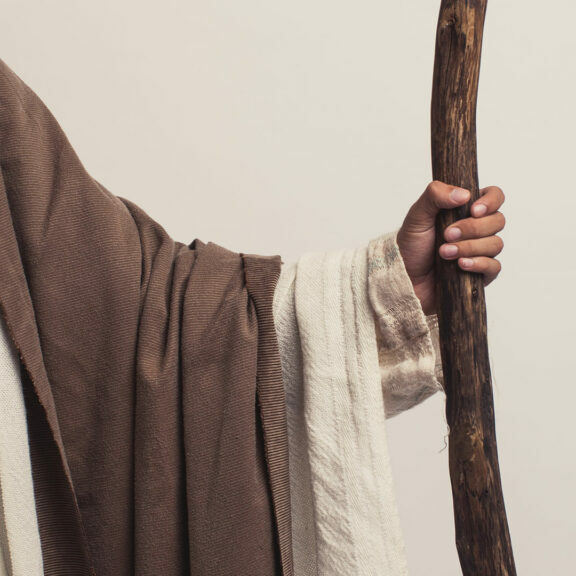December 9, 2018
Pastor Gunnar Ledermann
7 John said to the crowds coming out to be baptized by him, “You brood of vipers! Who warned you to flee from the coming wrath? 8 Produce fruit in keeping with repentance. And do not begin to say to yourselves, ‘We have Abraham as our father.’ For I tell you that out of these stones God can raise up children for Abraham. 9 The ax is already at the root of the trees, and every tree that does not produce good fruit will be cut down and thrown into the fire.”
10 “What should we do then?” the crowd asked.
11 John answered, “Anyone who has two shirts should share with the one who has none, and anyone who has food should do the same.”
12 Even tax collectors came to be baptized. “Teacher,” they asked, “what should we do?”
13 “Don’t collect any more than you are required to,” he told them.
14 Then some soldiers asked him, “And what should we do?”
He replied, “Don’t extort money and don’t accuse people falsely—be content with your pay.”
15 The people were waiting expectantly and were all wondering in their hearts if John might possibly be the Messiah. 16 John answered them all, “I baptize you with water. But one who is more powerful than I will come, the straps of whose sandals I am not worthy to untie. He will baptize you with the Holy Spirit and fire. 17 His winnowing fork is in his hand to clear his threshing floor and to gather the wheat into his barn, but he will burn up the chaff with unquenchable fire.” 18 And with many other words John exhorted the people and proclaimed the good news to them.
Luke 3:7-18
It’s Christmas time and by now I’m sure y’all have your trees up and decorated. It would be strange if you didn’t because the stores have had trees out on the floor for sale for the last three months, so we’ve all had plenty of time to get one. Once we all get our trees up, it’s time to compare trees, and it’s time for the debate to continue whether to have a real tree or a fake one. As time goes on, it’s getting harder to spot the difference between a real Christmas tree and a fake Christmas tree. Fake trees have come a long way in the last few years. Today fake trees come with all kinds of new features that promise to make them look, feel and even smell like a real tree. But with all of these advances in fake tree technology, all it takes to know if a tree is real or fake is to walk up to it and try to snap one of its branches. It’s easy to know if a tree is made of plastic and metal or wood and sap if you can get below the surface. Now, I wouldn’t suggest you go around to every Christmas tree you see this year and try to break the branches to see what’s inside because you won’t have any more friends by New Year’s Eve. It’s easy to spot a real and fake Christmas tree by looking below the surface and John the Baptist called the people of his day to look below the surface of their lives to see if they were real or fake followers of God. Today’s Gospel reading from Luke 3 therefore asks all of us if we are hypocrites that only look real on the surface or if we have repentant hearts that produce joyful works!
As our Gospel reading from Luke 3 begins, we find crowds of people coming to John the Baptist. The people coming to John had heard about his unique style. Mark tells us in his gospel that
John wore clothing made of camel’s hair, with a leather belt around his waist, and he ate locusts and wild honey.
Mark 1:6
John’s clothing was odd, even for the time, but his message was the real controversy. He was preaching and teaching repentance for the forgiveness of sins, and baptizing people in the Jordan River. John drew quite a crowd, but he was always careful to point to people away from himself and to the one more powerful. John was pointing the people to Jesus about whom he said,
“Look, the Lamb of God, who takes away the sin of the world!
John 1:29
John’s purpose was to point people to Jesus the Savior from sin, which is why he was calling them to repentance, but not all who came to him were repentant.
As John was preparing the way for Jesus, he knew he had to show the people their sins, if they were to see their need for the Savior.
7 John said to the crowds coming out to be baptized by him, “You brood of vipers! Who warned you to flee from the coming wrath?
The crowds were not looking for a real change of heart when they came to John. John was calling them to repentance for their sins, but the crowds wanted John’s baptism so that they could go on sinning. They didn’t want to produce any fruits after being baptized because that would mean giving up what God told them not to do. John called the crowds out on their hypocrisy by telling them that good, God pleasing fruits of faith flow out of a repentant heart. The word for repentance in Greek is μετάνοια or ‘a change of mind.’ The crowds who came to John were not repentant or sorry to God for their sins because they did not have faith or hope in their Savior for the forgiveness of sins.
John had to be clear with the crowds about the seriousness of their sins otherwise they would be lost forever. John said,
9 The ax is already at the root of the trees, and every tree that does not produce good fruit will be cut down and thrown into the fire.”
John was talking about their faithless hearts that would be lost to the fires of hell as punishment for their sins. The crowds could work to keep all of God’s laws, go to the temple, give offerings, sing and pray to God, even be baptized by John, but if it was all done to look good on the outside, they would be lost. The people could try to fool one another all they wanted, but they couldn’t fool God. God could see their sinful, faithless hearts that still held on to their sins.
In order to set the people straight, John used God’s law for the purpose God intended it. John used the law to show the people their sins as Paul said in Romans 3:20
Therefore no one will be declared righteous in God’s sight by the works of the law; rather, through the law we become conscious of our sin.
John’s words left the crowds stunned. No one had preached to them this way, so they asked,
10 “What should we do then?” 11 John answered, “Anyone who has two shirts should share with the one who has none, and anyone who has food should do the same.” Then 12 Even tax collectors came to be baptized…
And John told them
13 “Don’t collect any more than you are required to,” … 14 Then some soldiers…
came and John said,
“Don’t extort money and don’t accuse people falsely—be content with your pay.”
John was calling the crowds to do what should have been obvious to them, to keep God’s law. It should have been obvious, but keeping God’s law, which is really to
“‘Love the Lord your God with all your heart and with all your soul and with all your mind.’ and ‘Love your neighbor as yourself,’
Matthew 22:37-38
was not obvious to the crowd of unbelieving hypocrites.
John’s message to the crowds is the same message we need to hear. John said,
8 Produce fruit in keeping with repentance.
Time and time again, God makes it clear in the Bible that we are not saved by our works, but by Jesus’ perfect life for us sacrificed on the cross. This is the gospel, as Paul said in Romans 1:17
For in the gospel the righteousness of God is revealed—a righteousness that is by faith from first to last, just as it is written: “The righteous will live by faith.”
We are righteous or good in God’s eyes because of what Jesus has done for us. We have that righteousness by faith. And Paul says that the righteous will live by faith, which agrees with what John was saying,
8 produce fruit in keeping with repentance.
John’s message is that all who believe are repentant of their sins and in the freedom of Jesus’ forgiveness, believers will produce fruits, good works, acts of thanksgiving and lives that no longer live to serve sin and evil, but lives that live as citizens of heaven.
John’s point to the people was that they made it clear they were not believers by the absence of good. God’s work to make someone repentant is a change he makes in their heart. He causes us to repent and be sorry for our sins. Left to ourselves we love our sins. The sins society accepts, we do proudly out in the open and those that society hasn’t accepted yet, we still do, but only in secret. The question we must ask ourselves then is, “Are we eager to be forgiven for our sins knowing the joys of heaven waiting for us or are we eager to be forgiven so that we can continue sinning?” When confessing our sins is just a routine we follow to make God happy or look good for someone else, we are lost. If we are not struggling against our sins, but embrace them under the cover of darkness, we are lost. John 3:19 says,
“This is the verdict: Light has come into the world, but people loved darkness instead of light because their deeds were evil.”
If we continue to love darkness and sin rather than the light, then we will face God’s wrath. John spoke about Jesus’ coming that
17 His winnowing fork is in his hand to clear his threshing floor and to gather the wheat into his barn, but he will burn up the chaff with unquenchable fire.
Jesus coming means separating between believer and unbeliever.
The good news of Jesus’ coming is that we will be separated from the world. John’s picture of Jesus sorting the wheat harvest is good news for us. Jesus is pictured with the winnowing fork that was used to toss up the good wheat grains with the useless chaff so that the wind would blow away the chaff and leave the heavier grain on the threshing floor to be picked up and used for food. Basically, it was like having a fork that separated granola bars from lawn clippings. And the granola bars are believers and the grass clippings are unbelievers.
After John cut the people to the heart with the law, they were ready for the gospel. Luke wrote,
15 The people were waiting expectantly and were all wondering in their hearts if John might possibly be the Messiah. 16 John answered them all, “I baptize you with water. But one who is more powerful than I will come, the straps of whose sandals I am not worthy to untie. He will baptize you with the Holy Spirit and fire.
Jesus was the answer to the crowd’s sin and burdened consciences, and he is our answer too. John was a servant of God carrying out his mission as
“A voice of one calling in the wilderness, ‘Prepare the way for the Lord, make straight paths for him.’”
Matthew 3:3
Jesus was the promised Savior. He was the Son of God and Son of Man, who would come with the power and authority to give life and forgive. He sends the Holy Spirit to create faith, but for those who rejected Jesus, there would be fire and judgment.
We no longer fear the fire or wrath of God as the prophet Zephaniah wrote in our first reading from Zephaniah 3,
15 The Lord has taken away your punishment.
Through Jesus, we have been forgiven for our sins and we have no fear of punishment as Paul wrote in our second reading from Philippians 4:7
And the peace of God, which transcends all understanding, will guard your hearts and your minds in Christ Jesus.
The peace we have for all the times when our repentance was not sincere and for all the times when we continued to sin is beyond our understanding because those sins were taken away by the God we have sinned against as Zephaniah continued to say,
17 The Lord your God is with you, the Mighty Warrior who saves.
Jesus fought for you and I by his perfect devotion to his Father in heaven. God was pleased with his Son as Luke wrote just a few verses after our Gospel reading from Luke 3 after John the Baptist baptized Jesus,
22 And a voice came from heaven: “You are my Son, whom I love; with you I am well pleased.”
Since, God was pleased with his Son and his Son freed us from our sins, Zephaniah says, God
will take great delight in you; in his love he will no longer rebuke you, but will rejoice over you with singing.”
Without our sins separating us from God, he is pleased with us and rejoices over his people.
As a result of God’s work in us, we have repentant hearts and the gift of joy. John’s preaching to the crowds was summed up like this
18 And with many other words John exhorted the people and proclaimed the good news to them.
John left the crowds with the gospel. He had shown them their sins and their Savior. You and I know our sins and we know our Savior. The freedom we have in Jesus from both the punishment and power to turn away from sin give us every reason as Paul wrote in Philippians 4:4,
“Rejoice in the Lord always. I will say it again: Rejoice!”
Jesus’ forgiveness has changed us. Our repentant hearts lead us away from sin and now we live as Paul wrote,
5 Let your gentleness be evident to all. The Lord is near. 6 Do not be anxious about anything, but in every situation, by prayer and petition, with thanksgiving, present your requests to God.
As believers, we produce these joyful works because of Jesus’ joyful work for us.
By now you’ve had the joy of putting of your Christmas tree. Or you pretended to be joyful as you struggled with the sap of a real tree or the confusion of setting up a fake tree. As time goes on, it’s getting harder to spot the difference between a real Christmas tree and a fake Christmas tree. If you want to see if a tree is real or fake you’ve got to get up close and sometimes cut into it. John’s words cut the crowds to the heart and revealed which were repentant and which were hypocrites. Even as believers, we fall into the trap of hypocrisy, but Jesus has freed us from all our sins. One day, Jesus will completely free us from our sins by taking us to heaven, but until that day, we get to rejoice in God’s gift of repentance. When we bring our sins to God, they are forgiven and we are free to serve God and one another in love as the family of believers. Each good, kind and loving thing we do for one another is like opening the gifts underneath the Christmas tree. One day soon we will enjoy all good things in heaven. Until then, may God give us repentant hearts that produce joyful works! Amen.



